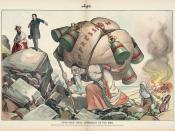Some hundred years ago, the oppressed broke away from the oppressor. They fought for the freedoms that we have today. Through different movements such as Black power, Black pride, and Black is beautiful, we've come to see the true power that we hold as individuals and a group. When the oppressed secedes from the oppressor, they must free themselves of oppression. Nadine Gordimer explores the theme of defying oppression through the use of characterization, setting, and tone in the short story "Africa Emergent".
In addition, in the story it is stated that "It is enough to be black; blacks are meant to stay put..." Elias Nkomo's defiance of the oppression in South Africa aided in his suicide. He freed himself from the oppressor there, but not from the oppression around him. Although he gave into the pressure eventually, he did take the first step. In his self discovery he realized that he could no longer accept the mediocrity that was expected of him.
When he began to question why things were the way they were, and how they were or came to be, he began to spread his wings of curiosity.
In general, the human characteristic of curiosity helps to aid in the evolution process. As Elias began to evolve, things around him remained the same. When he broke away from the oppressor, he was still oppressed, and that was detrimental to his ability to produce original works in America. As his settings changed from the oppressors in Africa to the oppressors in America he found no escape from oppression. In fact, he realized that the oppressors from Africa were still affecting him. The apartheid in Africa prevented black people from growing, and when he evolved enough to know that he had to see life out side of Africa; he was not welcome to come back to Africa. According to the short story "It was the South African government who killed him..."
Furthermore, the author's tone of regret helps to explain affects of oppression on every race. "Everything is ambiguous here" The different people didn't know what they could or couldn't do according to the law. It was hard to get around the law when working with black people. Everyone just had to accept there place and because of that didn't bother to fight any injustices or problems so they regretted that. In addition, because Elias was still being oppressed, he produced mediocre work and received approbation for it. He didn't think it was very meritorious but accepted the praises, and when he did that, he accepted his oppression. The only escape he found from that was death. His only freedom was to end his life in the hope that the oppression would no longer choke his life away or control him.
In short, when the curiosity of the oppressed allows them to evolve they must not only free themselves from the oppressor, but also from the oppression. Freedom from one and not the other does not emancipate nor liberate an individual as much as it retains their inferiority, imprisonment, and oppression. When the oppressed defies oppression they are no longer the puppets of the oppressors and must never return to that. When the oppressed learn to think for themselves they will emancipate themselves; then and only then can they really be free.


